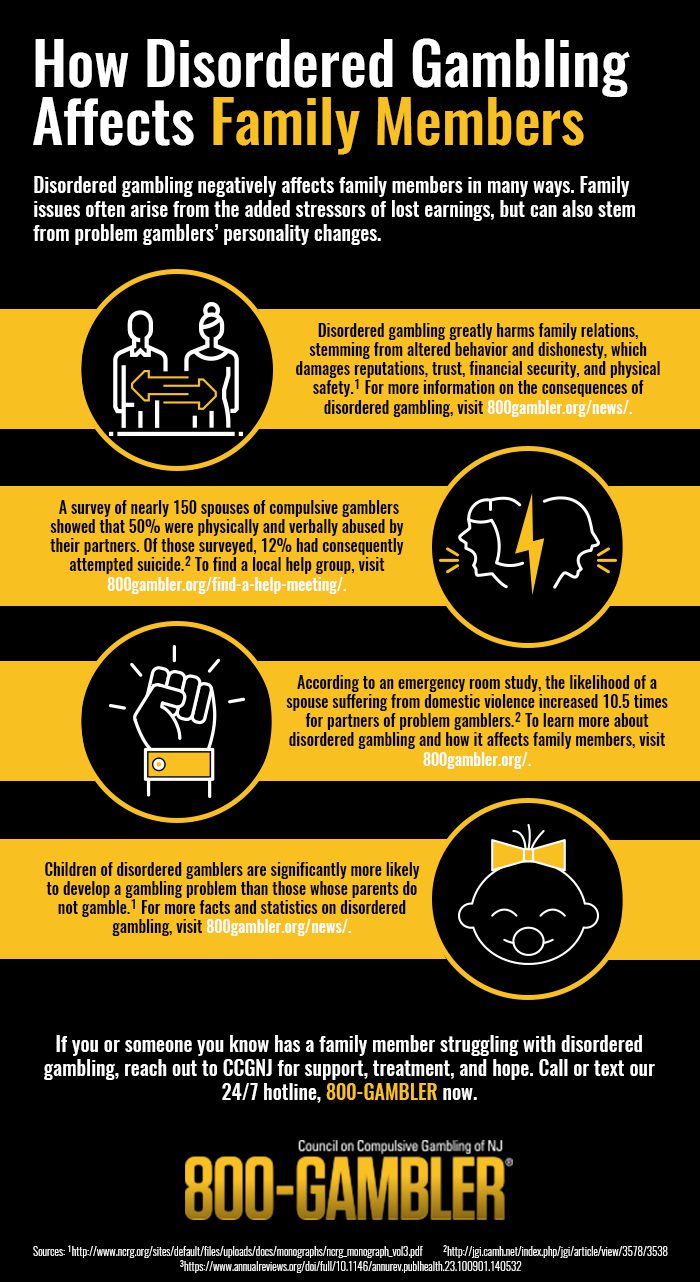Spouse Gambling Problem
- Dr. David B. HawkinsThe Relationship Doctor
- 200918 Feb
Editor's Note: Do you need sound, Biblically-based advice on an issue in your marriage or family? Dr. David will address questions from Crosswalk readers in each weekly column. Submit your question to him at TheRelationshipDoctor@gmail.com.
Dear Dr. David,
A gambling addiction - or compulsive gambling - is an illness that has no cure. If your husband can't control himself when it comes to betting, knowing how to handle his addiction can make the difference between helping him to arrest his illness and feeding his compulsion. Step 1 Learn about compulsive gambling. Talking to someone about problem gambling is never easy. It is important to remind them that you truly care for their well-being. Be specific and direct about your concerns; try to listen without. A gambling problem is defined as behavior that disrupts life, even if it’s not out of control. The reasons for excessive gambling vary, but many people use it to alleviate stress or feelings of incompetency. The following signs may indicate your spouse has a gambling problem: Increasing preoccupation with gambling that consumes excessive time. This problem needs to be treated like any other addiction. While our culture is quick to label addictions to alcohol and drugs, we are slower to confront addictions to processes, such as shopping.
I am writing out of frustration because of my wife’s shopping habit. We’ve been married for fifteen years, and ever since we’ve been married she’s had an addiction to shopping. It would be one thing if she spent a reasonable amount of money on keeping up her wardrobe, but it seems like her problem is getting worse. She spends more than we can afford, sneaks money to buy clothes and then returns many of the things she buys. When I confront her about her spending she gets incredibly defensive. We can’t talk about the problem without getting into horrible fights. The more she spends, and then hides her spending, the more I distrust her. I feel like my marriage is slipping away, and I don’t know what to do about it. She wants to treat it like nothing is wrong, yet my love for her is in danger. I’m about ready to give up on our marriage, yet don’t want to lose her. But, I can’t live like this any longer. I’ve read that this is a common problem, but if my wife won’t admit the problem, and if she won’t even talk to me about it, what can I do? Please help. ~ Going Broke
Dear Broke,
There are several issues that need to be addressed in your letter. Let’s take them one at a time.
The fact that your wife is secretive about her spending, and won’t allow you to confront her about it, is alarming. You’re right to call it an addiction, because secrecy and dishonesty are two of the hallmarks of addiction. Your wife’s spending is out of control and she undoubtedly knows it, thus leading to her secrecy and dishonesty.
This problem needs to be treated like any other addiction. While our culture is quick to label addictions to alcohol and drugs, we are slower to confront addictions to processes, such as shopping, gambling and eating, to name a few. Nonetheless, as your letter indicates, any addiction can be extremely debilitating and damaging to a relationship. I’m not surprised to hear that your trust for your wife is declining and your love for her is in jeopardy. This is the path of any addiction.
Now, what can be done about it?
First, it is important that you read about, and thoroughly understand the process of addiction. Knowledge and wisdom are critical first steps when facing any problem.
Second, after educating yourself about addictions, and knowing that your wife may continue to deny and minimize her problem, you must discontinue arguing with her about her problem. Her resistance to information, or intervention, further indicates an addiction. Addicts deny and minimize their problems, making those who confront them feel crazy. Armed with knowledge about this process, you’ll be less likely to fight with her. You won’t win this battle by convincing her of her problem. She must come to that realization on her own.
Third, prepare to take a tough stand. Addicts must reach their “bottom,” where their addiction no longer works for them. Your wife shops for a variety of “reasons,” and will likely give it up very reluctantly, and only when she must. The question will be whether she values her marriage more than her addiction, and only she can answer that. In the meantime, you must set a firm boundary—she must seek treatment for her addiction if she is to remain married to you. Also, I would suggest you seek out a trusted financial advisor. It will take time for your wife to conquer her addiction, and in the meantime, you do not want to be facing financial ruin.
Fourth, you must be prepared to take on the role of support and encouragement, not blaming and discouragement. Blame and shame are not helpful, as she undoubtedly already feels ashamed of her situation. While she will initially resent you for taking a stand, sometime in the future she’ll thank you for your strength.
Finally, let her know, firmly, that you are taking this stand because you love her. Remind her that you’re committed to her and will seek help with her. Let her know that you are open to exploring any role you might play in her problems and the unhappiness that may be fueling her addiction, while remaining firm that an intervention is critically necessary.
Spouse Gambling Problem
Dr. Hawkins is the director of The Marriage Recovery Center where he counsels couples in distress. He is the author of over 30 books, includingWhen Pleasing Others Is Hurting You, Love Lost: Living Beyond a Broken Marriage, andSaying It So He'll Listen. His newest books are titled The Relationship Doctor's Prescription for Healing a Hurting Relationship and The Relationship Doctor's Prescription for Living Beyond Guilt.Dr. Hawkins grew up in the beautiful Pacific Northwest and lives with his wife on the South Puget Sound where he enjoys sailing, biking, and skiing. He has active practices in two Washington cities.Spouse With Gambling Problem
Obviously, not everyone who gambles has a problem. Many people enjoy gambling as a social activity without it threatening their financial security or family relationships. Nonetheless, gambling can lead to addiction and serious consequences for those who can’t control the impulse. With as many as 3-5 out of every 100 gamblers, and as many as 750,000 young people ages 14-21 having a gambling addition, gambling can be compared to handling fire — it can either be used to your advantage, or seriously hurt you.
How can you tell when someone you love is developing a gambling problem? At what point does it become an addiction? These are questions you may be afraid to contemplate, but recognizing and admitting are the first steps to helping your spouse overcome a gambling problem and avoid further devastating consequences.
A Gambling Problem: Recognizing the Signs
A gambling problem is defined as behavior that disrupts life, even if it’s not out of control. The reasons for excessive gambling vary, but many people use it to alleviate stress or feelings of incompetency. The following signs may indicate your spouse has a gambling problem:
- Increasing preoccupation with gambling that consumes excessive time and money
- Feeling the need to try to recap losses instead of calling it quits
- Gambling that has a negative effect on mood, behavior, relationships, and financial stability
Basically, there may have a problem if you’re worried about your spouse’s behavior. Once recognized, it’s important to calmly confront your spouse and discuss how to handle it together. Extreme responses of ignoring/passively enabling the problem, or issuing ultimatums are not effective because they will allow it to escalate. The confrontations can also make your spouse feel attacked and defensive, which could lead to covert gambling.
Ideally, gambling problems can be resolved without outside help. It’s important to pinpoint your spouse’s reasons for gambling and create a game plan for addressing their underlying motivations and trigger points.
The Defining Line of Addiction: Loss of Control
There is a fine but distinct line between a gambling problem and a gambling addiction, but it can be summed up in this phrase: loss of control. Someone with a gambling problem may be on the path to an addiction, but they are still able to maintain some sense of control. In the case of an addition, the impulse to gamble calls the shots. Here are the major signs.

- Obsession with gambling. Gambling becomes so important and all-consuming that it takes priority over financial stability, relationships, and physical well-being.
- Inability to stop. As with other addictions, your spouse may recognize they have a problem and even try to rein it in, but are unable to control it on their own.
- Psychological withdrawal. When addicts aren’t able to gamble, they’re likely to become restless, irritable, and otherwise disturbed.
- Secretive, dishonest, or illegal behavior. As a gambling addict’s finances get worse, they may resort to desperate measures to continue their behavior without detection or immediate consequences.
- Denial. Addicts often have difficulty admitting they have a serious problem. The illusion of control is what continues to twist their minds into rationalizing their behavior.

Your spouse might have a diagnosable compulsive gambling disorder if these signs describe him or her, and it may be time to seek outside help through group therapy sessions or individual counseling. Gambling can be a fun pastime, or it can be a serious problem too. It’s important to recognize the difference between a hobby, a problem, and an addition, and respond in a way that protects your relational and financial health.